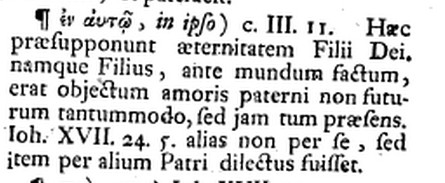 A little treat from 18th century Lutheran scholar J.A. Bengel’s commentary on Ephesians, or rather from the Ephesians section of his wonderful Gnomon of the New Testament. Commenting on Ephesians 1:4, “he chose us in him before the foundation of the world, that we should be holy and blameless,” Bengel says the following:
A little treat from 18th century Lutheran scholar J.A. Bengel’s commentary on Ephesians, or rather from the Ephesians section of his wonderful Gnomon of the New Testament. Commenting on Ephesians 1:4, “he chose us in him before the foundation of the world, that we should be holy and blameless,” Bengel says the following:
These things presuppose the eternity of the Son of God; for the Son, before the world was made, was not merely the future, but even then the present object of the Father’s love; John 17:24; John 17:5, otherwise the Father would not have loved Him in [or for] Himself [per se], but likewise through another [per alium: God would have loved in connection with the Church, not in Himself purely].
Bengelius was famous for the terseness of his comments, cramming as much insight into as few words as possible. He wrote in Latin, which lends itself to that sort of compact expression, and there was considerable debate about whether it was even worthwhile to translate his Latin Gnomon into any other language, especially a loose and sprawly language like English. Those of us who can’t construe Bengel’s dense Latin comments are grateful to have the vastly expanded English version of the Gnomon available.
What Bengel does in this comment on Ephesians 1:4 is explain what must be true if the gospel is true: these statements about salvation in Ephesians can only be true and effective if, in the deep background, the person in whom we were chosen was really and actually present. Unless we take this interpretive step back into the eternity of the Son of God, we have to imagine some other way that we could have been chosen “in him” from before we existed. The other possible answers are either unworthily weak (we were present in the mind of God with an ideal rather than actual pre-existence, which by the way would be all that the Son of God shares: a merely ideal pre-existence) or require some sort of coeternal preexstence of all creation (everything is actually there with God in eternity past, and merely manifests itself in the course of history).
These are bad options. The easy solution is the one Bengel points to: “These things presuppose the eternity of the Son of God.” The gospel works because the Trinity backs it. Salvation is grounded in the personal relations within the one Godhead.
Not only does that presupposition make sense of 1:4, it also explains why the rest of Ephesians unfolds as an exposition of our adoption into the family of God: Because the Son is eternally with and from the Father, our adoptive sonship by redemption is a gracious assimilation of our creaturely reality with the eternal love that is God. Haec praesupponunt aetermitatem Filii Dei.